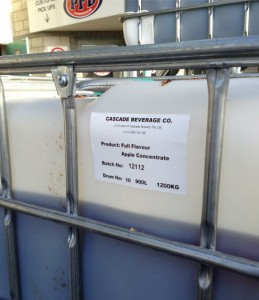Not enough apples in Tasmania
May 24
A Facebook friend recently shared this photo and the accompanying comment “obviously not enough apples in Tasmania”:
The image generated some ire amongst Facebook users, due to Cascade Brewery importing apples instead of getting them locally, even if that would mean keeping them in cool stores (which more correctly would be CA – controlled atmosphere – storage… keeping apples fresh in storage requires more than just keeping them cool).
Firstly, some disclosure: our family has benefited from a long relationship with Cascade, who have used our blackcurrants in their UltraC brand of blackcurrant syrup.
But that’s not the reason I’m writing this post. I’m writing this because it demonstrates what I see as a fairly recent phenomenon, which for now I’ll call “knee-jerk activism”. It seems everything can be a cause these days, and in some senses, that’s fantastic; more power to the people. But what of the potential of really muddying the waters? If it’s true that you can’t believe everything you read in the newspaper, it’s certainly true that you can’t believe everything you read in social media. But, increasingly, social media is the new newspaper. I’ve seen that for myself with some statistics I pulled from a website I recently developed, which was ‘advertised’ in an email mail-out, and on Facebook, and also in our local town newspaper (as a news article), the Huon News. The newspaper article generated fewer hits than the electronic ‘advertising’, even though the newspaper has a much broader reader base. Working in IT, this of course should have been no surprise to me, but still, it was interesting to see results in black and white (or blue and white, courtesy of Google® Analytics).
Where does this leave us regarding the quality of reporting, editorial influence, and journalistic integrity? It’s a bit of a worry. Regarding the photo above, I have no information to go on other than what’s in the photo and what I’ve gleaned (possibly only half-accurately) about Cascade’s processes. I don’t know if the guy who took the photo and posted it meant to imply that it was evidence of Cascade importing apples or not, but that’s how it was construed by other viewers. Another person took the time to at least call Cascade and ask whether they import apples or not (and was apparently advised that they do, in the local ‘off’ season), and to pose the question as to why, on Cascade’s own Facebook page.
But overall I find the “minor demonising” of a company based on one photo to be quite troubling. Firstly, to me, this looks like a photo of a cube of concentrate that Cascade themselves has produced, located on/outside the premises of PFD Food Services (which, if memory serves me correctly, is where Cascade stores their frozen stores – I believe their own storage was burnt down years ago). There’s every chance that the concentrate was produced from local apples. There’s also the possibility (due to my lack of knowledge about whether they convert imported apples into concentrate) that it’s from imported apples. My point here being that there’s no way of knowing from just one photo.
Secondly, producing product from produce on a commercial scale is rarely as simple as getting hold of the produce and popping it into a box. Apple juice is used in a great many products, so converting to concentrate makes sense from both a convenience and financial standpoint (i.e. it’s readily available as a consistent ingredient and takes less room – and therefore less energy – to store). It’s also quite possible that the demand for apple juice outstrips Tasmania’s ability to supply, especially in the consistency stakes – qualitatively (e.g. flavour profile) and quantitatively – that’s required for a commercial operation. Apple production in Tasmania is a fraction of what it used to be.
And thirdly, doesn’t it cut both ways? I’ve fronted up to a local apple stand to find it empty, because that grower’s apples have all been exported to meet the demand in Japan (where, presumably, prices were more appealing). Why would we expect a company to support local growers if the local growers are happy to disappoint local markets in preference for an overseas market?
For better or for worse, we live in a globalised world, and people need to make ends meet one way or another. Indeed, the idea that we’d rant against Cascade for not buying local is quite ironic since Cascade is now owned by a South African company. They may have a policy to buy local, but this wouldn’t be due to any parochial obligation, but would be a matter of finance, practicality, or a decision to support the community in which that plant’s employees are based.
For what it’s worth, in our experience, Cascade always demonstrated a very strong commitment to local producers, giving a fair price for a quality product. Indeed, it’s quite likely that the commercial blackcurrant industry would never have existed in Tasmania without Cascade’s willingness to commit to buying local product (which is a world commodity and available at cheaper prices elsewhere).
From the point of view of idealism, I’d like to see growers sell locally and buyers buy locally, and predominantly this is what characterised our experience with Cascade. Concessions may have to be made in a globalised world, but hopefully the tide may be turning back a little.
Regardless, my chief concern here is with the knee-jerk activism. From a position of idealism, perhaps we could make a mental note that there’s usually more to a picture than the picture may suggest, and start from that position, with a determination to fill out the blanks before coming to a judgement. The power we wield via new media is quite strong… use it for good, and not evil.


